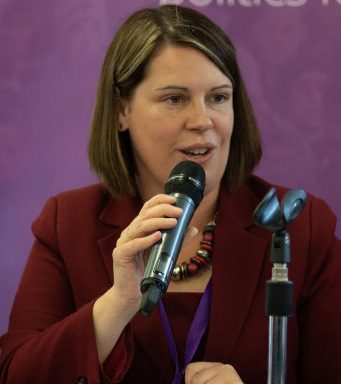The looming energy crisis has revived debate over the ownership of the UK’s utilities, with co-operators making the case for mutual alternatives to privatisation. But some co-op businesses running on tight margins are also looking ahead to a winter of soaring bills for lighting and heating.
With the government response to the crisis hindered by a drawn-out leadership campaign, opposition parties are calling for action to help householders and businesses through the crisis.
The Co-op Party’s assistant general secretary Emma Hoddinott was among those taking aim at the government. “A drastic rise in the energy cap over winter will see many bills become unaffordable for households,” she warned in a post on the Party website. “Like many big issues we face, the government has sat on its hands and failed to bring about the structural changes needed. A series of backward steps in policy have meant less investment in renewable energy and efficiency.”
Hoddinott said that rather than waiting for ministers to act, the co-op movement has been “self-organising locally to address failings of the energy market”, praising the UK’s 500 renewable community energy businesses. She also points to the work of Midcounties Co-op, “the only provider to offer a community energy tariff to its customers, where members have been able to support and fund community energy projects through their bills”.
Related: Credit unions sound the alarm over cost of living crisis
To build on this, the Party is calling on the government to set up a national fund for community energy, to create more projects that can cut bills locally and reduce the UK’s reliance on international energy markets.
Co-ops like Manchester’s Carbon Co-op contribute in other ways, by offering energy-efficient retrofits. “Almost half our housing in the UK has a low energy rating,” wrote Hoddinott. “There is a huge potential to make our homes more energy efficient and reduce bills, as well as reaching important targets to tackle climate change.
“Our homes account for more than 20% of the country’s total carbon emissions, mainly from our heating which is reliant on fossil fuels. Retrofit co-ops already exist, and they are already running retrofit projects, but we need this to be on a much larger scale, with national funding over the next decade. That’s why our members are backing the Great Homes Upgrade campaign, which is seeking to upgrade 19 million homes by 2030.”
Hoddinott argues that a regional network of retrofit co-ops would give residents a stake in the climate solution, “avoiding the pitfalls of previous national schemes that often used large contractors with many sub-contractors”. This often produced poor results, she said, while “many retro-fit co-ops now provide an end-to-end service, with quality control built in.

“With a consistent infrastructure, they can ensure long-term quality investments in houses and invest in the green skills needed to expand retrofitting.”
Examples include the Retrofit Skills Hub, launched in Greater Manchester by mayor Andy Burnham “to educate over a thousand of people in retrofitting skills”.
She added: “These local solutions are in existence now: the challenge is to scale them up. With a renewed focus from government and sustainable funding, our co-operative movement can play a bigger role in addressing the energy crisis.”
But while co-ops can help tackle the energy crisis at source, there is still the immediate problem of rising energy bills. Experts warn that inflation in the sector could hit 18% next year, leaving households facing bills of £6,000 a year.
Rising costs also threaten businesses. Plunkett Foundation, the charity which represents rural community-owned businesses in the UK, told Co-op News it is “receiving more and more calls from members asking for advice and help”. For some, energy bills are expected to increase by more than 150%, which potentially makes them unsustainable.
Head of policy Chris Cowcher said: “The energy price rises are coming at a time when many businesses are still managing the impact of the pandemic, with diminished financial reserves and fatigued staff and volunteers.
“Coupled with increasing operating costs, including staff costs and supply charges, there is a genuine concern among businesses as to what the future holds. For some the pressures require them to consider their long-term plans and many are talking to their community shareholders to decide on what course of action to take.”
Related: Community energy ‘needs government backing in fight against climate change’
And he warned: “New community business groups face rising interest rates and fundraising at a time when all people have less disposable income.”
Plunkett offers practical business support to new and established community businesses – work which currently has “an immediate and short-term focus”, said Cowcher, with advisers helping businesses review their cashflow forecasts, revise business plans and look at all efficiencies that can be made.
“We’re also looking at ways they can raise funds, in the face of these rising costs. Crowdfunding campaigns and open community share offers are being launched by some and the search for grant assistance is a priority.”
Plunkett is also working with membership suppliers, such as energy brokers and companies, to see if any deals can be offered, and is encouraging community businesses to complete energy audits for their buildings to see if consumption can be reduced.

“It is clear that these are unprecedented times,” added Cowcher. “No community-owned business should struggle alone without seeking our help and advice and while Plunkett will not on its own resolve the situation we are working with partners from across the sector in a coordinated effort to lobby for government action to support community businesses.
“We would very much like to see an immediate energy price cap, to give some certainty as to outgoing costs and further ahead are calling for genuine investment for businesses to transition to more self-sustaining energy solutions in future.
“The Community Ownership Fund continues to be vital for the future of the sector, but should be expanded to recognise changing business pressures and the very real benefits they bring to their communities in times of dire need and crisis.”
Specific business sectors concerned about the impact of energy costs include arts venues – with Salford’s Lowry complex warning it could be forced to close if expectations of a £1m bill turn out to be accurate.
The grassroots end of the arts scene is also vulnerable – and includes a number of co-operatively owned venues. The Music Venue Trust, which has co-signed an industry letter to business, energy and industry secretary Kwasi Kwarteng and chancellor Nadhim Zahawi, warning that “pubs, restaurants, music venues, nightclubs, hotels and wider hospitality have reached the point where the conditions for trading are so prohibitive that many venues are already reducing the hours they open their doors.
“Others are confronted with the threat of permanent closure. With chronic challenges in the supply chain, labour shortages, interest rates and inflation, rocketing energy prices have become a matter of existential emergency for businesses in our sector.”
Mark Davyd, CEO of the Music Venue Trust, co-signed the letter with representatives of UK Hospitality, the Nighttime Industries Association, the British Beer and Pub Association and the British Institute of Innkeeping.
They warned that average annual energy bill increases for the sector are around 300%, putting at risk businesses and jobs. And they call into question the current model of the energy sector. “It is clear that a significant number of energy providers have withdrawn service provision from the hospitality market altogether,” the letter says. “The primary purpose of a free market for energy supply to businesses is to create competition, which leads to improved services, competitive rates, resilient suppliers, and the ability to invest in long-term and sustainable solutions to energy demand.
“In the hospitality sector, there is unequivocal evidence that this primary purpose is failing.”
The group says the energy crisis is a “threat to the nation” and requires urgent government attention. “Not all businesses will be able to survive this onslaught,” they wrote, “and those that can will be closely considering how they can keep their costs down just to stay afloat.”
Calling on ministers to outline a support package for the hospitality sector, which “provides 10% of jobs and 5% of GDP, they add: “We urge you not to allow the stasis of party politics to stifle the urgent delivery of action on energy.”
The UK is not the only country where the energy crisis is demanding the attention of the co-op sector. In Belgium, Reuters has reported rising interest in renewable energy co-ops as householders look to escape the spiralling bills under conventional private providers.
Co-ops like Ecopower generate their own power and therefore avoid volatile energy markets, says the report. But Ecopower has been forced to turn down applications for membership because it cannot meet the demand.
“Our promise is not that we are always going to be the cheapest,” Ecopower spokeswoman Margot Vingerhoedt told Reuters. “We provide an answer to the triple crisis of climate change, geopolitical dependency, as well as price inflation and energy poverty. The sky-high prices make the situation worse and traditional energy firms do not address that because their main focus is profit.”
And in the US, NRECA, which represents rural electric co-ops, says supply chain disruptions from Covid-19 and the Ukraine war bring “unprecedented challenges in procuring key grid components like transformers, conductor and power poles”. There are a number of reports in the US media of electric co-ops warning members of impending price hikes, and calling on customers to reduce consumption.
For support from Plunkett Foundation email [email protected]